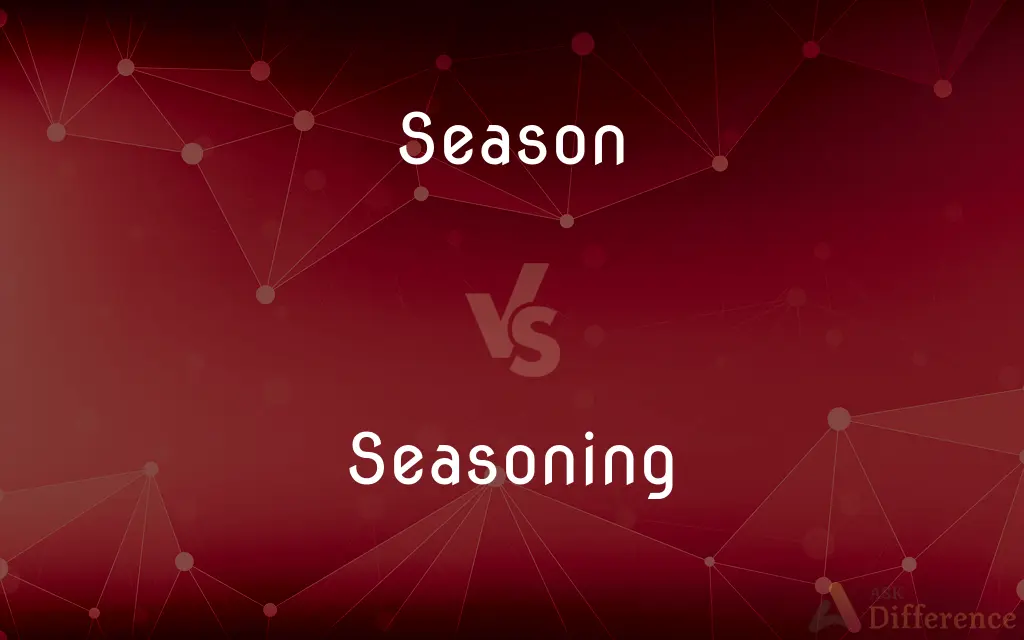Season vs. Seasoning — What's the Difference?
By Tayyaba Rehman & Urooj Arif — Updated on April 28, 2024
Season refers to one of the four periods of the year, characterized by specific weather conditions, while seasoning is a process or ingredient used to enhance the flavor of food.

Difference Between Season and Seasoning
Table of Contents
ADVERTISEMENT
Key Differences
Season refers to one of the four divisions of the year—spring, summer, autumn, and winter—each marked by unique weather patterns and daylight hours, driven by the Earth's position relative to the sun. On the other hand, seasoning can refer to both the process of adding herbs, spices, or other flavor-enhancers to food during cooking, and to the substances used in this process.
Seasons are primarily determined by astronomical events such as solstices and equinoxes, which dictate the transition from one season to another based on the Earth's orbit. Whereas seasoning does not depend on natural cycles, but rather on culinary practices that vary from culture to culture, reflecting local tastes and available ingredients.
In many cultures, seasons play a crucial role in determining agricultural and social activities, aligning planting and harvest times with optimal climatic conditions. Seasoning, in contrast, plays a critical role in gastronomy, influencing the taste, aroma, and sometimes the preservation of food.
Seasonal changes are predictable and have profound effects on the environment, influencing animal behavior, plant growth, and even human mood and activities. Meanwhile, seasoning is used intentionally by cooks to control or enhance flavors in dishes, making it an essential tool in both home kitchens and professional culinary settings.
The concept of a season is universally understood across different cultures, though the specifics and implications of each season can vary greatly depending on geographic location. Seasoning, while also a global concept, involves a wide variety of substances and techniques that can be highly specific to particular cuisines or dishes.
ADVERTISEMENT
Comparison Chart
Definition
A period of the year marked by specific climatic conditions.
Substances added to food to enhance flavor.
Nature
Cyclical and natural.
Culinary and artificial.
Purpose
Dictates climate and related phenomena.
Enhances or alters the taste of food.
Variability
Fixed by astronomical cycles.
Varies by culture and personal preference.
Cultural Importance
Affects agriculture, festivals, and clothing.
Central to culinary arts and food preservation.
Compare with Definitions
Season
Winter.
Winter brings snow and ice in many regions.
Seasoning
Salt.
Salt is used to enhance the natural flavors of food.
Season
Autumn.
Leaves change color in autumn.
Seasoning
Herbs.
Herbs like basil are used for fresh aromas in cuisine.
Season
Spring.
Spring is known for blooming flowers.
Seasoning
Marinade.
Marinade often includes various seasonings to tenderize and flavor meats.
Season
Summer.
During summer, days are longest.
Seasoning
Spices.
Spices like cinnamon are used for their strong flavors and aromas.
Season
Rainy Season.
The rainy season is crucial for crops.
Seasoning
Pepper.
Pepper adds a spicy touch to dishes.
Season
A season is a division of the year based on changes in weather, ecology, and the number of daylight hours in a given region. On Earth, seasons are the result of Earth's orbit around the Sun and Earth's axial tilt relative to the ecliptic plane.
Seasoning
Seasoning is the process of adding herbs, salts or spices to food to enhance the flavour.
Season
Each of the four divisions of the year (spring, summer, autumn, and winter) marked by particular weather patterns and daylight hours, resulting from the earth's changing position with regard to the sun.
Seasoning
Something, such as a spice or herb, used to flavor food. Also called seasoner.
Season
A set or sequence of related television programmes; a series
The first two seasons of the show
Seasoning
The act or process by which something is seasoned.
Season
A period when a female mammal is ready to mate
The bitch can come into season at irregular intervals
Seasoning
(cooking) Something used to add taste or flavour to food, such as salt and pepper or other condiment, herb or spice.
Season
Add salt, herbs, pepper, or other spices to (food)
Season the soup to taste with salt and pepper
Seasoning
Anything added to increase enjoyment.
Season
Make (wood) suitable for use as timber by adjusting its moisture content to that of the environment in which it will be used
I collect and season most of my wood
Seasoning
A coat of polymerized oil inside a cooking vessel which renders the surface non-stick.
Season
One of the four natural divisions of the year, spring, summer, fall, and winter, in the North and South Temperate zones. Each season, beginning astronomically at an equinox or solstice, is characterized by specific meteorological or climatic conditions.
Seasoning
(archaic) An alcoholic intoxication.
Some of our gentlemen officers, happening to stop at a tavern, or rather a sort of grogshop, took such a seasoning that two or three of them became “quite frisky.”
Season
The two divisions of the year, rainy and dry, in some tropical regions.
Seasoning
In diamond-cutting, the charging of the laps or wheels with diamond dust and oil.
Season
A recurrent period characterized by certain occurrences, occupations, festivities, or crops
The holiday season.
Tomato season.
Seasoning
Present participle of season
Season
A suitable, natural, or convenient time
A season for merriment.
Seasoning
The act or process by which anything is seasoned.
Season
A period of time
Gone for a season.
Seasoning
That which is added to any species of food, to give it a higher relish, as salt, spices, etc.; a condiment.
Season
To improve or enhance the flavor of (food) by adding salt, spices, herbs, or other flavorings.
Seasoning
Hence, something added to enhance enjoyment or relieve dullness; as, wit is the seasoning of conversation.
Political speculations are of so dry and austere a nature, that they will not go down with the public without frequent seasonings.
Season
To add zest, piquancy, or interest to
Seasoned the lecture with jokes.
Seasoning
Something added to food primarily for the savor it imparts
Season
To treat or dry (lumber, for example) until ready for use; cure.
Seasoning
The act of adding a seasoning to food
Season
To render competent through trial and experience
A lawyer who had been seasoned by years in the trial courts.
Season
To accustom or inure; harden
Troops who had been seasoned in combat.
Season
To moderate; temper.
Season
To become usable, competent, or tempered.
Season
Each of the four divisions of a year: spring, summer, autumn (fall) and winter
Season
A part of a year when something particular happens.
Mating season
The rainy season
The football season
Season
A period of the year in which a place is most busy or frequented for business, amusement, etc.
Season
(cricket) The period over which a series of Test matches are played.
Season
(obsolete) That which gives relish; seasoning.
Season
A group of episodes of a television or radio program broadcast in regular intervals with a long break between each group, usually with one year between the beginning of each.
The third season of Friends aired from 1996 to 1997.
Season
(archaic) An extended, undefined period of time.
Season
(video games) The full set of downloadable content for a game, which can be purchased with a season pass.
Season
(video games) A fixed period of time in a massively multiplayer online game in which new content (themes, rules, modes, etc.) becomes available, sometimes replacing earlier content.
Season
(transitive) To habituate, accustom, or inure (someone or something) to a particular use, purpose, or circumstance.
To season oneself to a climate
Season
To prepare by drying or hardening, or removal of natural juices.
The timber needs to be seasoned.
Season
(intransitive) To become mature; to grow fit for use; to become adapted to a climate.
Season
(intransitive) To become dry and hard, by the escape of the natural juices, or by being penetrated with other substance.
The wood has seasoned in the sun.
Season
(transitive) To mingle: to moderate, temper, or qualify by admixture.
Season
(obsolete) To impregnate (literally or figuratively).
Season
(transitive) To flavour food with spices, herbs or salt.
Season
One of the divisions of the year, marked by alterations in the length of day and night, or by distinct conditions of temperature, moisture, etc., caused mainly by the relative position of the earth with respect to the sun. In the north temperate zone, four seasons, namely, spring, summer, autumn, and winter, are generally recognized. Some parts of the world have three seasons, - the dry, the rainy, and the cold; other parts have but two, - the dry and the rainy.
The several seasons of the year in their beauty.
Season
Hence, a period of time, especially as regards its fitness for anything contemplated or done; a suitable or convenient time; proper conjuncture; as, the season for planting; the season for rest.
The season, prime for sweetest scents and airs.
Season
A period of time not very long; a while; a time.
Thou shalt be blind, not seeing the sun for a season.
Season
That which gives relish; seasoning.
You lack the season of all natures, sleep.
Season
To render suitable or appropriate; to prepare; to fit.
He is fit and seasoned for his passage.
Season
To fit for any use by time or habit; to habituate; to accustom; to inure; to ripen; to mature; as, to season one to a climate.
Season
Hence, to prepare by drying or hardening, or removal of natural juices; as, to season timber.
Season
To fit for taste; to render palatable; to give zest or relish to; to spice; as, to season food.
Season
Hence, to fit for enjoyment; to render agreeable.
You season still with sports your serious hours.
The proper use of wit is to season conversation.
Season
To qualify by admixture; to moderate; to temper.
Season
To imbue; to tinge or taint.
Season their younger years with prudent and pious principles.
Season
To copulate with; to impregnate.
Season
To become mature; to grow fit for use; to become adapted to a climate.
Season
To become dry and hard, by the escape of the natural juices, or by being penetrated with other substance; as, timber seasons in the sun.
Season
To give token; to savor.
Season
A period of the year marked by special events or activities in some field;
He celebrated his 10th season with the ballet company
She always looked forward to the avocado season
Season
One of the natural periods into which the year is divided by the equinoxes and solstices or atmospheric conditions;
The regular sequence of the seasons
Season
A recurrent time marked by major holidays;
It was the Christmas season
Season
Make fit;
This trip will season even the hardiest traveller
Season
Make more temperate, acceptable, or suitable by adding something else; moderate;
She tempered her criticism
Common Curiosities
Are the seasons the same worldwide?
No, seasons vary significantly in timing and characteristics across different geographic locations.
Can seasoning affect the nutritional value of food?
Yes, some seasonings can add nutritional value, such as minerals from salt or antioxidants from herbs.
How do seasons affect agriculture?
They dictate the best times for planting and harvesting crops based on weather conditions.
What is the purpose of seasoning?
To enhance or alter the flavor and sometimes preserve the food.
How do seasonal changes impact wildlife?
They affect migration patterns, hibernation, and reproductive cycles of various species.
What factors influence the onset of a season?
Primarily the Earth’s tilt and orbit around the sun which affect solar energy received.
What are the four seasons?
Spring, summer, autumn, and winter, each associated with specific weather patterns and daylight hours.
What are common types of seasoning?
Common types include herbs, spices, salt, pepper, and culinary acids like vinegar or lemon juice.
Is seasoning used in all culinary traditions?
Most culinary traditions use some form of seasoning, though the ingredients and methods can vary widely.
How does climate change affect seasons?
It can alter the duration and intensity of seasons and affect traditional weather patterns.
Do all cultures use the same seasonings?
No, seasoning choices vary greatly between cultures, reflecting local tastes and available resources.
Share Your Discovery

Previous Comparison
Aurum vs. Gold
Next Comparison
Bow vs. SternAuthor Spotlight
Written by
Tayyaba RehmanTayyaba Rehman is a distinguished writer, currently serving as a primary contributor to askdifference.com. As a researcher in semantics and etymology, Tayyaba's passion for the complexity of languages and their distinctions has found a perfect home on the platform. Tayyaba delves into the intricacies of language, distinguishing between commonly confused words and phrases, thereby providing clarity for readers worldwide.
Co-written by
Urooj ArifUrooj is a skilled content writer at Ask Difference, known for her exceptional ability to simplify complex topics into engaging and informative content. With a passion for research and a flair for clear, concise writing, she consistently delivers articles that resonate with our diverse audience.
















































